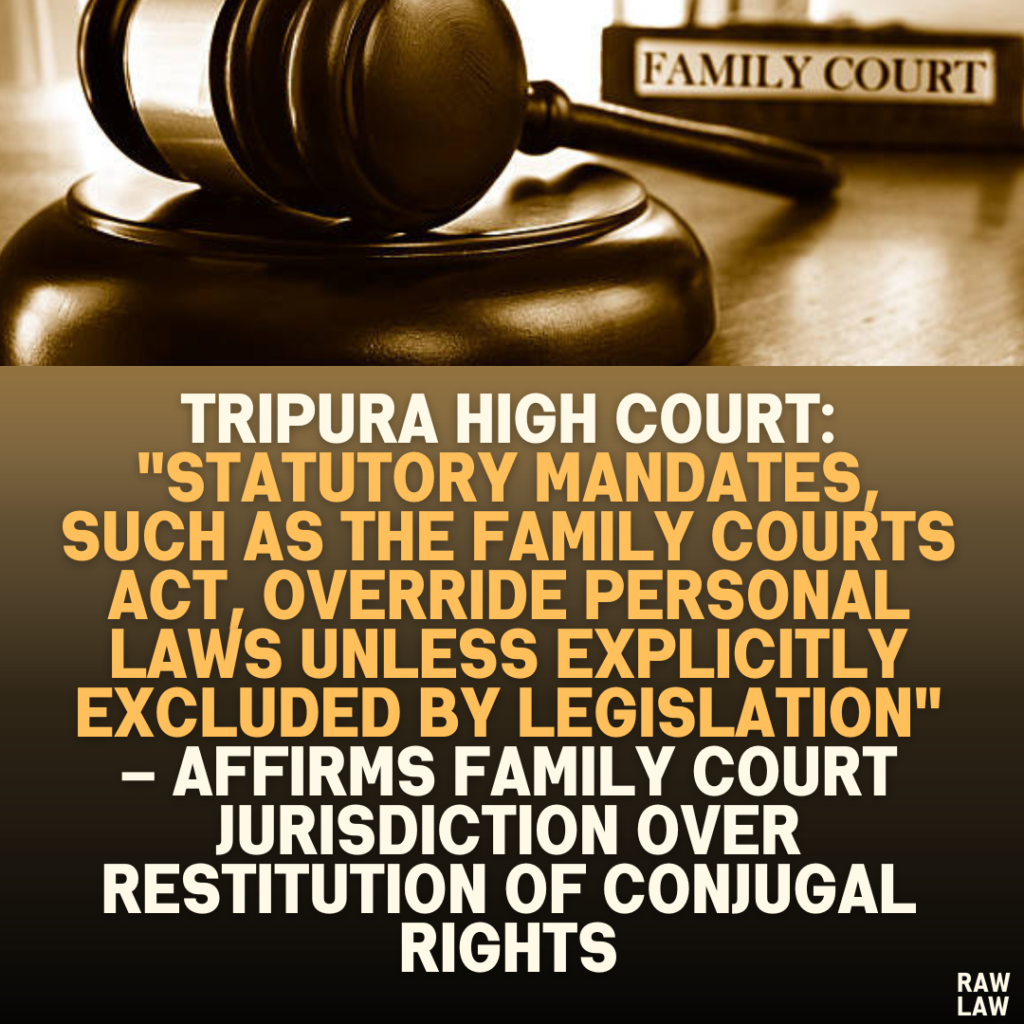Court’s Decision:
The Tripura High Court ruled that the Family Court has exclusive jurisdiction to entertain suits related to restitution of conjugal rights, even when governed by personal laws such as Mohammedan Law. The Family Courts Act, 1984, overrides personal law in such matters unless specifically excluded by statutory provisions. The lower court’s dismissal of the suit for lack of jurisdiction was deemed erroneous and set aside. The case was remanded for adjudication on merits.
Facts:
- Marriage and Dispute:
- The appellant (husband) and respondent (wife) were married on March 14, 2022, according to Muslim rites.
- They cohabited briefly at the appellant’s family home. However, the respondent left on August 18, 2022, citing a temporary visit to her parental home but did not return as planned.
- The respondent later refused to cohabit, alleging “flimsy grounds” for her actions, leading to marital discord.
- Reconciliation Efforts:
- A panchayat meeting was convened on May 22, 2023, to resolve the dispute, but the respondent refused to continue the marital relationship without reasonable cause.
- Legal Action:
- The appellant filed a suit for restitution of conjugal rights under Section 281 of Mohammedan Law, which was dismissed by the Family Court on the ground that personal law governs the parties and the suit was non-maintainable.
Issues:
- Whether the Family Court has jurisdiction to adjudicate cases of restitution of conjugal rights governed by Mohammedan Law.
- Whether the dismissal of the suit by the Family Court, citing lack of jurisdiction, was legally sustainable.
Petitioner’s Arguments:
- Jurisdiction of Family Courts:
- The appellant contended that under Section 7 of the Family Courts Act, 1984, Family Courts have exclusive jurisdiction over matrimonial disputes, including those related to restitution of conjugal rights, regardless of the personal law governing the parties.
- Reinstatement of Suit:
- The appellant sought the reinstatement of the dismissed suit, arguing that the trial court erred in holding that it lacked jurisdiction due to the parties being governed by Mohammedan Law.
Respondent’s Arguments:
- Applicability of Personal Law:
- The respondent’s counsel asserted that matters of marriage and restitution of conjugal rights for Muslims are governed by Mohammedan Law and fall outside the purview of the Family Courts Act.
- Academic Nature of the Issue:
- The respondent claimed that the matter had been amicably settled, rendering the issue academic. This claim was denied by the appellant, who insisted that a decision on the merits was necessary.
Analysis of the Law:
- Family Courts Act, 1984:
- The Act was enacted to establish specialized courts for resolving matrimonial and family disputes.
- Section 7(1)(a) explicitly provides Family Courts with exclusive jurisdiction to entertain suits related to matrimonial disputes, including restitution of conjugal rights.
- Mohammedan Law and Personal Law:
- Under Section 281 of Mohammedan Law, a husband may sue for restitution of conjugal rights if his wife ceases cohabitation without lawful cause.
- However, the Family Courts Act applies to all matrimonial disputes unless explicitly excluded by statute.
- Uniform Jurisdiction:
- The Statement of Objects and Reasons of the Family Courts Act clarifies its applicability across all communities, irrespective of religious or personal laws, unless expressly excluded.
Precedent Analysis:
The court reiterated that personal laws cannot override statutory mandates unless explicitly exempted. The Family Courts Act was designed to ensure uniform adjudication of matrimonial disputes, emphasizing that specialized forums like Family Courts are empowered to address these issues comprehensively.
Court’s Reasoning:
- Misinterpretation by the Trial Court:
- The trial court erroneously held that it lacked jurisdiction due to the parties being governed by Mohammedan Law. The High Court clarified that Section 7 of the Family Courts Act explicitly grants jurisdiction over all matrimonial disputes, including restitution of conjugal rights.
- Statutory Mandate:
- The High Court emphasized that unless personal laws are expressly excluded by statutory provisions, the Family Courts Act applies uniformly. The law of the land supersedes personal law in matters of jurisdiction.
- Exclusive Jurisdiction:
- The court observed that the Family Courts Act aims to provide a specialized and uniform mechanism for resolving matrimonial disputes, ensuring equitable justice irrespective of community or religion.
Conclusion:
The High Court:
- Set aside the trial court’s order dated September 5, 2023.
- Reinstated the suit and remanded the matter for adjudication on merits.
- Directed the Family Court to exercise its jurisdiction under the Family Courts Act and proceed in accordance with the law.
Implications:
- Uniform Applicability of Family Courts Act:
- The judgment reinforces the uniform applicability of the Family Courts Act across communities, ensuring that matrimonial disputes are adjudicated within its procedural framework.
- Supremacy of Statutory Law:
- It affirms that statutory mandates, such as the Family Courts Act, override personal laws unless explicitly excluded by legislation.
- Access to Specialized Forums:
- The ruling underscores the importance of specialized forums like Family Courts in addressing matrimonial disputes comprehensively and uniformly.




Pingback: Delhi High Court Rejects Income Tax Department’s Appeal: "Penalty Notices Must Specify Charge—Concealment or Inaccurate Particulars—Failure Violates Natural Justice and Renders Penalties Unenforceable" - Raw Law
Pingback: Jammu & Kashmir HC Grants Bail in UAPA Case: Allegations of Militant Meeting with Lashkar-e-Taiba, Jaish-e-Mohammed, and Poster Recovery Lack Specific Evidence Linking Appellants to Terrorist Acts — "While UAPA Is Stringent, It Does Not Warrant